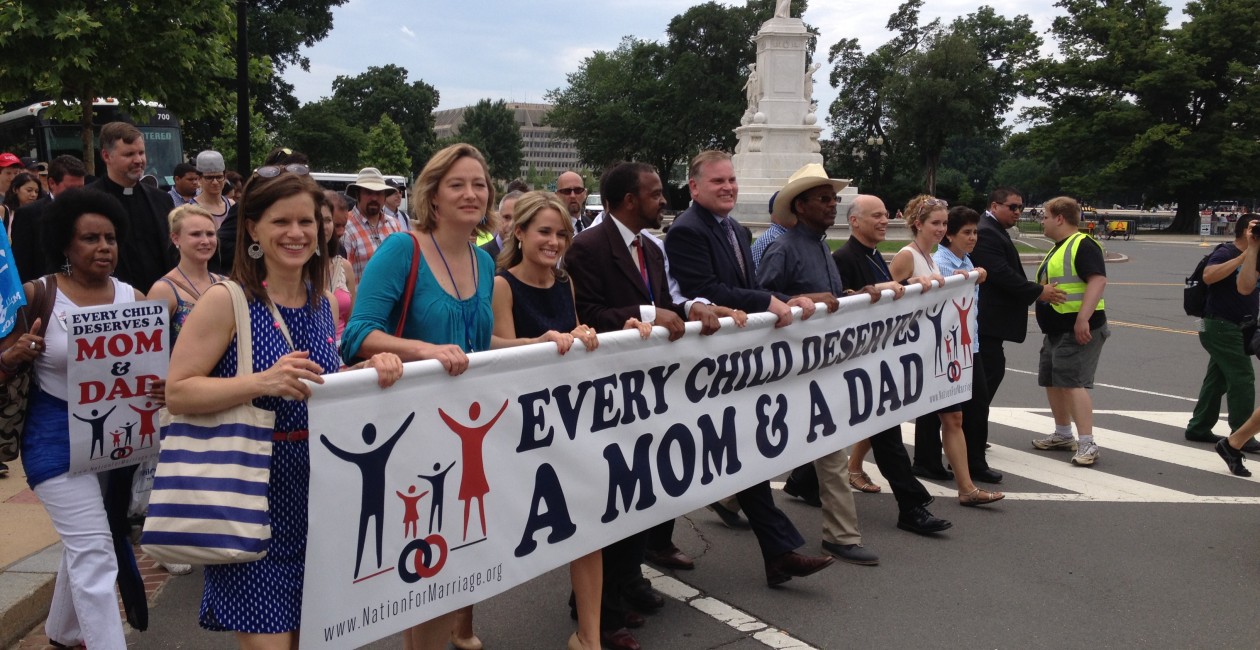What you need to know about the Equality Act
One of history’s great literary classics is Homer’s Iliad, which tells the story of the Trojan horse—the wooden horse that the Greeks hid in to enter the city of Troy. Disguised as a gift, the wooden horse was a deadly subterfuge that should have been burnt and thrown out.
Two thousand and some odd years later, certain lawmakers1 are employing this same trick with Congressional bill proposal H.R. 52 – deceptively titled the “Equality Act,” the bill is an intolerant abomination disguised as a gift for human rights.3
The Equality Act (the “Act”) proposes to amend the Civil Rights Act of 19644 to include protection against discrimination on the basis of “sex (including sexual orientation and gender identity).”5 In summary, the Act purports to protect LGBTQ Americans by prohibiting discrimination “based on sex, sexual orientation and gender identity in areas including public accommodations and facilities, education, federal funding, employment, housing, credit and the jury system.”6 On the surface, this sounds innocuous and just.
In reality however, the Act redefines sex as an individual-specific, relative standard that includes gender identity and sexual orientation, undermines religious freedom, gives males who identify as females the right to women’s spaces, and sets a dangerous political precedent for the medical treatment of confused children suffering from gender dysphoria.7 The Act defines “public accommodations”8 so loosely9 and calls for regulations so “sweeping”10 that it would crush religious freedom and radically reshape American society.
Currently, the House of Representatives has already welcomed this Trojan horse into Congress, passed it, and sent it to the Senate.11 Only the Senate’s approval is standing between the Act and the president’s desk in the Oval Office.
Here are 4 reasons why the Act is a dangerous threat to our society:
1. It would severely restrict religious freedom.
Many Christians believe that marriage is between one man and one woman. Under the Act, not acknowledging gay marriage or even just refusing to bake a cake to celebrate a gay marriage would become punishable under federal law – providing another legal means of attacking and prosecuting Christian business owners like Colorado baker Jack Phillips.12
2. It would compel speech.
Pacific Justice Institute is currently defending a Washington public school teacher in the Tahoma School District, who is being compelled to use a student’s preferred pronouns, contrary to the student’s biological sex and contrary to the teacher’s sincerely held religious beliefs. The Tahoma School District is forcing this teacher to violate his religious belief that God created human beings male and female.13 If passed by the Senate, the Act would trample this teacher’s Constitutionality protected First Amendment rights.
3. It could lead to more parents losing custody of their children.
Pacific Justice Institute fought for a mother who was in danger of losing her child’s custody for refusing to agree with a psychiatrist’s assessment that her child’s sex should be changed. If our law defines sex to include gender identity or gender preference, many more parents could end up losing custody of their children for simply refusing to acknowledge preferred sex.
4. It will lead to loss of privacy for women.
The Act would require adherence to its new view of sex and gender, characterized by self-defined “orientation” and “expression,” in public places such as restrooms. Any man, whether transgender or not, can self-identify as females and gain access to female restroom under the Act.14 The proposed Act could impose a nationwide bathroom policy that would leave women and children in particular vulnerable to predators.
The Act promotes inequality by elevating the ideologies of special-interest groups to the level of protected groups in civil rights law. If passed, the Act would mandate government-imposed unfairness by requiring acceptance of a particular ideology about sexual ethics. Although the Act’s stated goal is equality, its actual result is harm to vast numbers of communities and individuals, including those it purports to protect.
Please join PJI and defend Religious Freedom.
Sign the petition below and tell our Senate to stop the Equality Act.
1H.R. 5 (the ‘Equality Act’) was introduced in the House of Representatives by David Cicilline (D – RI) on March 13, 2019. Library of Congress, Representative David N. Cicilline, https://www.congress.gov/member/davidcicilline/C001084?q=%7B%22sponsorship%22%3A%22sponsored%22%D(accessed Nov. 17, 2019). Representative Cicilline is also an original cosponsor of H.R.5036, “To prohibit the Secretary of Health and Human Services from taking any action to implement, enforce, or otherwise give effect to the final rule, entitled “Protecting Statutory Conscience Rights in Health Care; Delegations of Authority.” Library of Congress, Cosponsors: H.R.5036 – 116th Congress (2019-2020), https://www.congress.gov/bill/116th-congress/house-bill/5036/cosponsors?r=4&s=1 (accessed Nov. 17, 2019). Representative Cicilline has positions on a number of committees, subcommittees and caucuses, including Co-Chair of the LGBT Equality Caucus. David Cicilline, About Me – Committees and Caucuses, https://cicilline.house.gov/about-me/committees-and-caucuses (accessed Nov. 17, 2019). See also, Jeremy W. Peters, “Openly Gay and Openly Welcomed in Congress,” The New York Times, Jan. 25, 2013.
2H.R. 5–Equality Act, 116th Congress, May 17, 2019, https://www.congress.gov/bill/116th-congress/house-bill/5 (accessed Nov. 17, 2019).
3See, e.g., Emilie Kao, The Heritage Foundation, H.R. 5 Is No Act of Equality, Mar. 25, 2019, https://www.heritage.org/gender/report/hr-5-no-act-equality (accessed Nov. 17, 2019).
4Civil Rights Act, 42 USCS § 2000e (1964).
5H.R. 5–Equality Act,§3(a)(1).
6Congressional Research System, Library of Congress, Summary: H.R.5 – 116th Congress (2019-2020), May 17, 2019, https://www.congress.gov/bill/116th-congress/house-bill/5 (accessed Nov. 17, 2019).
7See American Psychiatric Association, Diagnostic and Statistical Manual of Mental Disorders, 5th ed., 2013, https://www.psychiatry.org/psychiatrists/practice/dsm (accessed Nov. 17, 2019)(According to the American Psychiatric Association, most children who experience gender dysphoria (up to 88 percent of girls and up to 98 percent of boys) will naturally resolve their gender dysphoria as they mature). See also, American College of Pediatricians, Gender Ideology Harms Children, Sept. 2017, https://www.acpeds.org/the-college-speaks/position-statements/gender-ideology-harms-children (accessed Nov. 17, 2019).
8If amended as proposed by H.R. 5, the Civil Rights Act would govern any public accommodation within its newly expanded definition of a regulated “establishment.” Id., at §3. The Civil Rights Act currently includes, as regulated establishments, any “(1) inn, motel, [or] hotel…(2) any restaurant, lunchroom, restaurant, lunch counter, [or] soda fountain…[and] (3)any motion picture house, theater, concert hall, sports arena, [or] stadium…” Civil Rights Act, 42 USCS § 2000a (b). As proposed and passed by the House of Representatives, H.R. 5 would expand this definition of a regulated public accommodation to include any “…place of or establishment that provides exhibition, entertainment, recreation, exercise, amusement, public gathering, or public display;(4) any establishment that provides a good, service, or program, including a store, shopping center, online retailer or service provider, salon, bank, gas station, food bank, service or care center, shelter, travel agency, or funeral parlor, or establishment that provides health care, accounting, or legal services;(5) any train service, bus service, car service, taxi service, airline service, station, depot, or other place of or establishment that provides transportation service…” H.R. 5–Equality Act, at §3.
9Id.
10Catie Edmondson, “House Equality Act Extends Civil Rights Protections to Gay and Transgender People,” The New York Times, May 17, 2019 (“The House passed sweeping legislation on Friday that would prohibit discrimination on the basis of sexual orientation and gender identity.”)
11Library of Congress, Actions Overview H.R. 5 – 116th Congress (2019-2020), https://www.congress.gov/bill/116th-congress/house-bill/5/actions (accessed Nov. 17, 2019).
12Masterpiece Cakeshop, Ltd. v. Colo. Civil Rights Comm’n, 138 S. Ct. 1719 (2018).
13The Tahoma School District’s guidelines follow the model guidelines drafted by Washington’s Office of the Superintendent of Public Instruction (“OSPI”), which expressly compel a teacher to refer to students not by their biological sex and legally given name, but rather by the students’ preferred pronoun and name. OSPI, Students’ Rights Gender: Expression and Gender Identity, p. 2 (2019), https://www.k12.wa.us/sites/default/files/public/equity/genderidentity/genderidentity_english.pdf (accessed Nov. 17, 2019).
14See, e.g.Edmondson, “House Equality Act Extends Civil Rights Protections,” The New York Times(“The legislation, which amends the Civil Rights Act of 1964, prohibits discrimination of lesbian, gay, bisexual and transgender people in both the public and private sectors, offering civil rights protections in businesses, hospitals and welfare services. It explicitly states that individuals cannot be denied access to a locker room or dressing room on the same basis.”).






